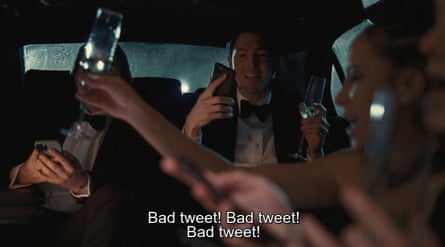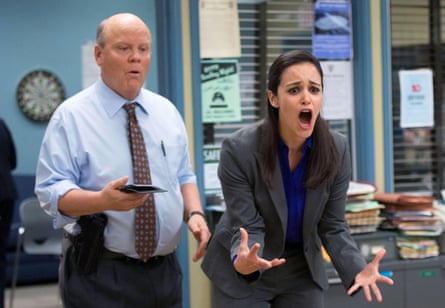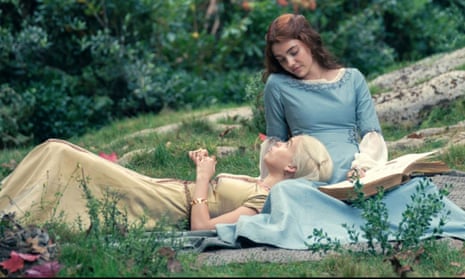‘I never jest about cake,” quips princess Rhaenyra Targaryen in the first episode of HBO’s Game of Thrones spin-off, House of the Dragon. It’s a seemingly charming line, delivered while her head lolls on her best friend’s lap, helping to build Rhaenyra’s character as someone who doesn’t take herself too seriously. It is also so instantly quotable, and therefore T-shirtable, that the line is already plastered on fan-made merch.
But to some viewers, it rang false. They had seen this pattern before: show writes meme-able scene; scene becomes meme; instant marketing; profit.
“Ugh someone in the Game of Thrones prequel just said ‘I never jest about cake’ so this is gonna be part of the ‘primarily written with the epic gifs in mind’ genre of shows,” tweeted Zack Budryk, a reporter at The Hill.
TV programmes and the lines that make us laugh have always been shared and discussed afterwards. So, with the universality of Twitter and other social media, it’s only natural that programmes’ “relatable” lines, moments or scenarios are increasingly meme-ified among their fanbase, being shared widely and eventually permuted into other established jokes on the internet. But sometimes, it can feel as though shows are being written with the online reaction in mind, particularly given that in our internet-saturated age, the online temperature can make or break a piece of media.

Take Succession, an excellently written show that benefited hugely from its quotability. Some lines seemed to have been crafted specifically for the online fans. “I’d like my Twitter to be off the hook,” one character advises his PR, while another suggests that they should respond to bad reviews of their girlfriend’s play by “jumping on the irono-cycle” and turning it into “a thing for the hipsters and the dipshits”. In one scene in the third season, politically patricidal Kendall Roy and his cronies are scrolling Twitter, scanning for negative sentiment, when they begin to cry: “Bad tweet! Bad tweet!” Screencaps of the moment were instantly shared between the hordes of viewers on – guess what – Twitter.
“Becoming a meme totally helps a show,” says James Capel, a screenwriter for series including ITV’s Cold Feet. “Seeing memes pop up online brings a whole new audience. It gets to the point where I have to watch a show because I get sick of not knowing what all the memes are about! It’s the same way we feel about having our shows make it on to Gogglebox: if it’s creating memorable moments that are quotable, funny, emotional, then we’re doing our job right.”
Some commentators point out that writing a series in the hope of seeing its memes go viral is not necessarily a wise move. “A big part of when the original [Game of Thrones] started to sag was when they couldn’t actually think of anything plot-relevant for Tyrion to do so they’d just have him pop up to coin new Tyrionisms,” Budryk also tweeted. While this tactic can bring in more views, it risks doing so at the expense of the story and the established personalities of the characters.
Others disagreed with this criticism, however, replying: “Can’t wait for the coming era of screenwriting wherein people avoid saying anything at all memorable to avoid accusations of writing with gifs in mind.”
In a sense, these quotable lines tap into a fine tradition of TV scripting. “Writers have always sought to create these ‘meme-able’ moments”, says Kelsey Kirvan, a writing instructor at Vancouver film school. “Even before the invention of social media, sitcom writers would craft catchphrases for their characters that could easily be referenced by fans of the show, even if they didn’t always get the line quite right. ‘Lucy, you’ve got some explaining to do!’ from I Love Lucy is an often misquoted example from the earliest days of the medium. So, if it’s a trend, it’s been a very long one.”

One consequence of this is the rise of “no context” accounts, for example Out of Context House of the Dragon, No Context Succession and No Context Brooklyn Nine-Nine, which share screencaps from the shows involving funny lines – naturally, out of context. The general formula of a viral post from a No Context account is a screencap of a character saying or doing something ridiculous or relatable: in other words, the magic ingredients of a meme. So popular are these pages that the official Sex Education Twitter account rebranded itself as a No Context page during the show’s third season.
Anna is behind one such account: a No Context Succession page that has amassed more than 150,000 followers. She thinks there are certain things that make a scene worthy of being immortalised in the Twitter meme canon.
“Succession’s language is so specific, unique and captivating that nearly every line is worthy of being ‘memed’, even if it’s just somebody saying ‘fuck off’ or ‘bad tweet!’” she says.
As someone who pays attention to every moment of the show, Anna agrees that shows such as Succession might write specifically to relate to their online audience, but only in the context of the characters and the way they relate to the online world. “While it seems like the writers of Succession are attuned to trends on places like Twitter, what they write doesn’t come across as pandering. Writing Kendall as being obsessed with validation on Twitter is both consistent with who he is as a character and a light jab at anybody who thinks too hard about what the Extremely Online thinks.”
Capel, though, doesn’t think we are headed in the direction of writers deliberately writing to appeal to people online. He believes the jokes arise because programme-makers are creating content that appeals to the types of people who make and share memes.
“From a TV writer’s perspective, it’s not something that’s thought about too much,” he says. “When crafting a show, of course we’re looking to create funny, emotional or memorable moments – but generally we’re thinking about it in terms of the wider story. Memes and quotes are a reaction, and every audience member reacts differently. Our job is to make it work first and foremost. It’s not up to us to necessarily anticipate how they’ll react.”
Whether it’s deliberate or not, in the digital world we live in, where people’s careers and friendships depend on their online connections, TV programmes and films will of course reference and slot into that world. Everything from politics to pets becomes a meme these days, so why would entertainment be any different, especially when characters on TV are often caricatures of the very people we know to be the worst online. Memes about our beloved shows and movies are here to stay – whether or not they jest about cake.

Comments (…)
Sign in or create your Guardian account to join the discussion